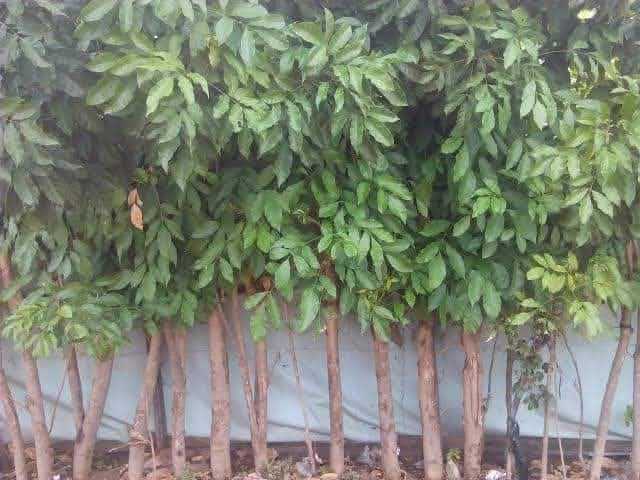
The Enuani Way Of Life
The Enuani Way of Life
As most communities in Enuani are located in a dense and fertile rainforest, agriculture, fishing, bronze casting, orthodox health services, sorcery, and hunting were the commonest occupation of early Enuani men.
The women were exceptionally talented in weaving of fabrics known as akwa-ọcha and traditional midwifery. Most women also engage in trade of fish, jewelry, ornaments and food produce.
Yam is the male symbol while palm tree is the female symbol. A very successful man is called "dịji" (master of yam) while a very successful woman is greeted "Ome-Akwụ" (processor of palm oil).
The most common agricultural products were yam, cassava, palm fruits/wine, etc. The commonest designs of weave are, mkpụlụ-ọka, kilikili star, aka ngwose, and mkpọpu styles of the highly fashionable clothing material. The weaving industry was so organised that raw materials such as wool were planted, harvested, processed and utilised in making high quality fabrics. The traditional weaving set up is assembled using locally sourced materials and is known as “Nsụ”.
The men when they attain maturity undergo the rites of passage known as "ịwa-akwa" (wearing of clothes) before they are presented a piece of cloth to cover their nether region. The older men adorn a piece of weaved white cloth, usually tied around one shoulder or simply tied around the waist. The women wore a piece of breast cloth and “mpe” a short skirt. They also adorn jewelries made from ornamental beads, ivory, cowries, and precious stones or shell.
Drawing of patterns in form of henna or tattoos using “Uli” a seed dye was also common. This paintings on the female body to enhance maiden beauty is akin to modern day tattoo.
The “Ikolo” young men wore canine teeth of the big cats they have killed as ornament around their necks, a sign of strength and valour.
In addition, the earliest Enuani people who spoke Igbo language despite their migration history were self sufficient through the practice of subsistent agriculture, blacksmithing, arts including sculpture, making of percussion drums etc. Such skills run in a family and the children are taught to continue the family business.
The men who are farmers often have a well built “Ụnọ-Ub or Ụnọ-Ogo” farmstead. The men leave home to their farmland which is often hours walk from their home on “Olie” market day and return home on “Nkwọ” day. The fourth day which is “Eke” is a resting day. That completes the one week in the calendar of an Enauni man. He cooks, eats and sleeps in the farmstead from Olie to Nkwọ, tending to his farm and returns home to rest on Eke days.
The commonest food to the men was soup and pounded yam. This food is prepared in turns by the wives and served for the whole family. The men also cooked for their wives at the “Unor Ubi” farmstead. The native soup of most Enuani communities is “Ogwulu” large volume banga soup. The soup is an advancement from the smaller volume “Ofe-Akwụ” banga soup, and yam is used as thickener. Palm fruits are squeezed to make the soup which is usually served in big ceremonies with a large, calabash spoon called “Oziozi”. There are other unique delicacies such as nsala, ilolo/ogili (egwusi) as well as Ose-ani.
Sociology and social lifestyle of Enuani people is both remarkably exciting and educative.
Activities such as recreational amusement engaged in by the natives were very well organized. The “Ụmụaka” children had a wide range of childhood play including, fụnchọ, nzizo, egwu nni-aja, ọga, (girls only) etc. The elders take delight in watching the children play and relive their childhood years.
The young men engaged in wrestling and other activities. The greatest weapon of teaching that parents employed was the art of storytelling. Their wards are meant to learn from the mistakes of the characters depicted in the stories. The characters are painted in such a way that they teach morality and portray the consequences of recalcitrant behaviours.
The commuities have four rotational market days begining with Eke, Olie, Afọ and Nkwọ.
The Obi (Eze, Asagba,Akor) is the king of a community and leadership is mostly by primogeniture.
However, some communities are led by
led by gerontocracy. Alongside the king is an overall leader of the womenfolk known as “Ọmụ" who is a spiritual leader and cordinator of economic and commercial activities at the market.
Each commumity is made up of lineages and each lineage is led by the oldest surviving male known as “Dịọkpa” ( a short form of Dị-ọkpala).
The dịọkpa is often sage and his cabinet is made up of other four men, including him but who are his immeadiate yoounger ones in the hierarchy. He forms this cabinet of four elders and “Ọga” provost and liaison officer.
These people assist in decision-making and smooth administration of the lineage. The lineage leadership carries out administrative, legislative and some judicial functions. For instance, the lineage leadership can execute punishment to any individual or family that went afoul of tradition, excommunicate and impose huge fines. This pattern is replicated by the womenfolk and is headed by the "Ada" (the oldest female born to that lineage).
There is also a “Ikolo leader” youth leader who mobilizes the youths for several activities. The group is further divided into a group for very young people known as "Ikolo-nziza-ezi" (young environmental officers) whose duty it is to carry out clean up exercise, community policing etc. The two groups are the judiciary arm of the lineage government. The basic leadership apparatus is the family leadership. The head of this group is called “Okpala Ụnọ/Dịọpka Ezi n’unor” (he is the oldest man in the family). He is often the oldest surviving male in the family and as noted earlier, there is a replication of this leadership system among the womenfolk headed by the "Ada ezi-n'ụnọ".
Religious practices and worship may vary from family to family. Some families have a shrine for the god they chose to worship. The shrine is often bequeathed to them by their ancestors but the lineage has one shrine in the place called “Ishu-Ani” where they occasionally gather for cleansing and thanksgiving to Chi-ukwu, the ALMIGHTY and overakin God.
The lineage Diopka is the head of every group and he reports to “Ndi Oli Nzele Ani” (usually through the lineage chief, an Idima) the council of Chiefs who report to the "Obi" King.
The leadership for women is headed by the “Ada Ebo” oldest woman from the lineage.
She is in charge of coordinating the women folks and maintaining cultural values. For instance if a woman commits adultery, it is in her jurisdiction to carry out all the necessary sanctions including propitiation of adultery. The lineage leader of all the wives into a lineage is called “Anasi-Ebo”. She is the oldest wife in that lineage. A maiden is referred as nwa-agbọ, a group of maidens Ụmụ-agbọ whereas a married woman is referred as Okposho-Ọba (or Ikpoho-Oba).
© Enuani Cultural Forum


